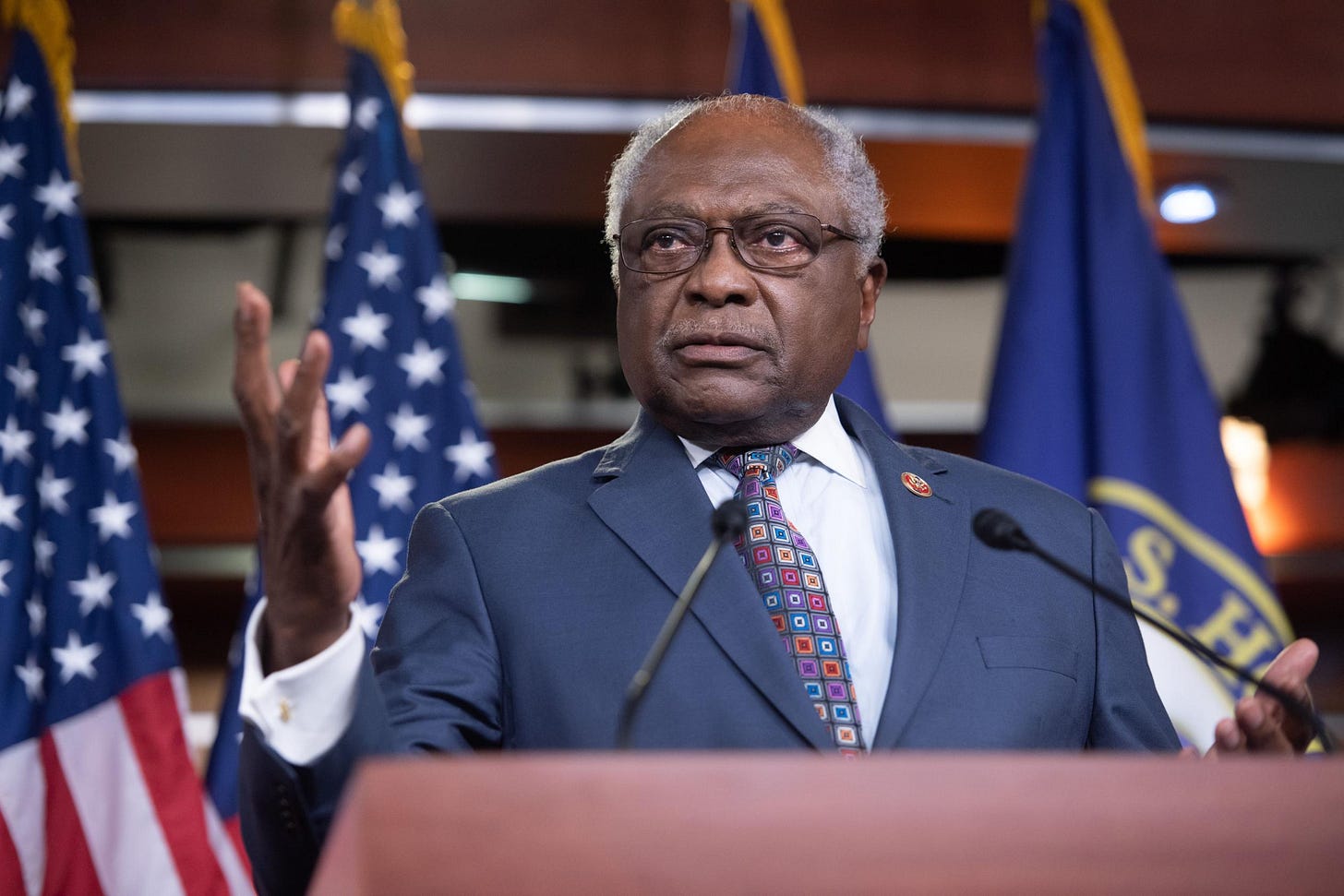Uphold Jim Clyburn Thought!
Democrats would be wise to heed the South Carolina representative’s political counsel

If there’s any one person responsible for defeating President Trump and putting Joe Biden in the White House, it’s Rep. Jim Clyburn of South Carolina. His endorsement of Biden ahead of his state’s pivotal Democratic presidential primary propelled Biden to a decisive victory in that contest. On the strength of his performance in South Carolina, Biden went on to win the Democratic nomination and then the presidency. Given that Biden was likely the only one of some twenty Democratic presidential hopefuls capable of besting Trump at the ballot box, it’s hardly an exaggeration to say that Clyburn’s intervention spared the country the disaster of a second Trump term.
When Clyburn speaks about politics, then, Democrats ought to listen. That makes his rare endorsement of a mainstream center-left candidate in a special election in Cleveland to fill the House seat vacated by Secretary of Housing and Urban Development Marcia Fudge all the more noteworthy. In an interview with the New York Times explaining his decision to intervene in this race, Clyburn made his logic clear:
What I try to do is demonstrate by precept and example how we are to proceed as a party. When I spoke out against sloganeering, like ‘Burn, baby, burn’ in the 1960s and ‘defund the police,’ which I think is cutting the throats of the party, I know exactly where my constituents are. They are against that, and I’m against that.
It’s all the more important that Clyburn’s connects his concern about extremist rhetoric on the left with action on behalf of moderate Democratic candidates. As Clyburn himself put it in the wake of the 2020 election, slogans like “defund the police” hurt Democratic House candidates – an observation made by other Democratic House members like Rep. Abigail Spanberger of Virginia.
The trouble for Democrats in 2020 wasn’t that they embraced the left’s unpopular and unwise rhetoric. For the most part, Democrats from candidate Biden on down didn’t advocate such positions. But by and large, they failed to actively disassociate themselves from extreme stances they didn’t agree with. That created the false impression that Democrats as a whole supported these views, or at least cultivated a sense that they tolerated them more than most voters were comfortable with – and that sense, as Spanberger and others noted, lent credence to Republican attack ads.
Clyburn’s intervention in the Ohio special election – and, crucially, how he’s explained it – suggests that on a certain level Democratic political leaders realize that association with the catchphrases and policy positions of the progressive left drags down the party as a whole. It’s just a first step, but it’s a step in the right direction. The more Democratic candidates and party leaders actively oppose what Clyburn aptly calls “sloganeering” from the left, the better off they’ll be come election day.
It’s a message reinforced by the results of the New York City mayoral primary. Leading candidate Eric Adams may not eventually win the Democratic mayoral nomination due in part to the city’s convoluted new ranked-choice voting system, but his initial success shows there’s very little political downside to ignoring vocal but unrepresentative activist groups. Kathryn Garcia, currently in a close second place, also blasted her rivals during the campaign for endorsing “defund the police” hashtags, saying that instead “You need to sit down and really think through these things.” To put it another way, neither of the two remaining Democratic mayoral candidates adopted the fashionable slogans of the progressive left – and paid no real political price for it.
Over the past several years, however, most mainstream Democrats have attempted to co-opt an increasingly loud progressive left that’s put forward a raft of unpopular political slogans and unwise policy ideas. This effort reached its apotheosis during the 2020 presidential primary contest, when virtually every Democratic candidate save Biden rushed to endorse the latest left-wing fad. Sen. Elizabeth Warren (D-MA), for instance, undermined her own campaign by fashioning a “Medicare for All” proposal that she couldn’t fully explain, as did then-Sen. Kamala Harris (D-CA) during her own presidential bid. Other examples abound, such as Sen. Ed Markey (D-MA) co-sponsoring Rep. Alexandria Ocasio-Cortez’s (D-NY) “Green New Deal” proposal in Congress or elite framing of Clyburn’s own race-indifferent 10-20-30 anti-poverty plan as reparations for slavery. Whatever Democrats may have gained from these efforts to win the support of activists, they lost more by alienating mainstream voters skeptical of the progressive left’s rhetoric and policy proposals.
In reality, most voters – especially Democrats and independents – remain normies. They’re culturally moderate and economically nationalist, not highly educated avant-garde socialists or activists. Democrats ought to follow Jim Clyburn’s lead and start to clearly differentiate themselves from a progressive left with whom they fundamentally disagree on questions of both style and substance. As Clyburn recognizes, moreover, they’ve got to know exactly where – and who – their constituents actually are, and act accordingly.
That may create a political and ideological conflict that many within and around the Democratic Party would rather avoid. But it’s a conflict that already exists, and one that cannot be wished away or postponed if Democrats hope to win moving forward.


